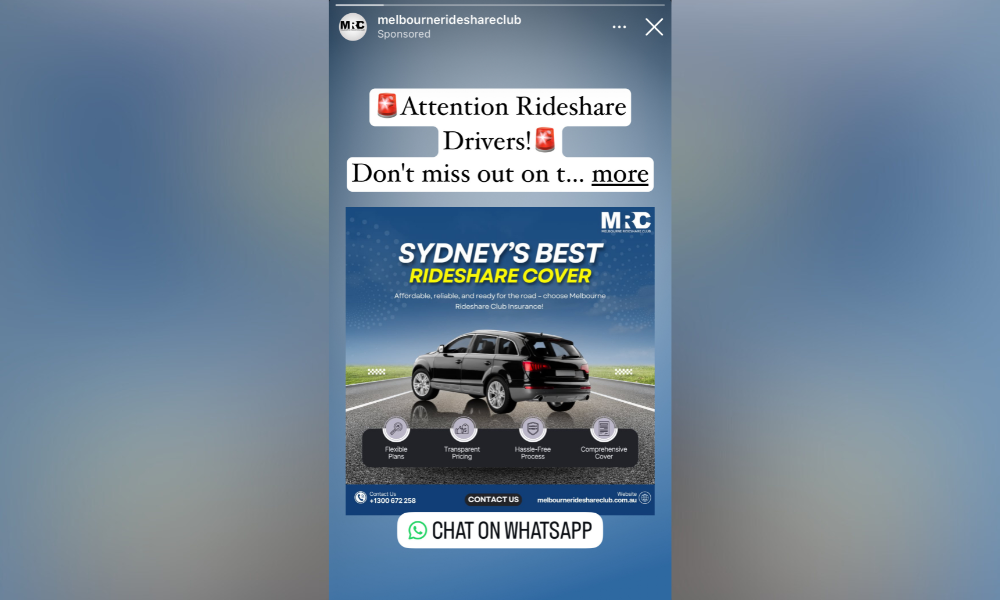

Taxi and rideshare clubs in Victoria are allegedly selling substandard motor coverages to 100s of drivers without the Australian Financial Services Licence (AFSL) legally required by insurance firms. The issues that result can include inadequate compensation following accidents, payments that are delayed many months and drivers being taken to court.
Lawyers and victims have told Insurance Business that Melbourne Rideshare Club, Metropolitan Taxi Club, Platinum Taxi Ride Share Club and CTRS Taxi Club are among the alleged culprits. These rideshare clubs cannot be found on the Australian Securities and Investments Commission’s (ASIC’s) Professional Registers list. This online register lists firms with an AFSL license. A Google search reveals that possibly dozens of these motor clubs exist.
Their customers are often taxi, Uber and DoorDash drivers who can find themselves, said one lawyer, facing considerable financial risks.
The clubs allegedly entice sign-ups through advertisements on their websites, Instagram (pictured immediately below) and Facebook with product descriptions that clearly suggest their motor coverage offerings are the equivalent of insurance. They often allegedly describe the offerings as “cover” rather than insurance but website banners and tabs mention “compulsory third party coverage” and “comprehensive motor vehicle coverage.”
“Enjoy complete peace of mind,” says one website. Some of the clubs even provide user friendly apps for their “members”.

Joseph Nunweek, legal director of WEstjustice, said his legal help group has seen dozens of cases. The number has spiked upwards in recent months, he said, with one or two cases each fortnight from the Western Melbourne area alone. However, the total number of cases could be much higher.
The legal director said the issues often take three forms. The first involves a rideshare driver who thought they were covered by insurance for car accidents but ends up in court.
“They have an accident where they're at fault, or they're alleged to be at fault, they notify the taxi club, they hear nothing and don't get any engagement,” said Nunweek. “Meanwhile, the other driver’s insurer is taking action against them personally in the Magistrates Court or elsewhere.”
Nunweek said “for all intents and purposes” this rideshare driver is in a situation of being uninsured.
He said other cases can arise when a person thought they had the equivalent of comprehensive car insurance and needs vehicle repairs or replacement.
“Those people are just being left without a vehicle for months,” said Nunweek. “Of course, their vehicle is their tool of the trade and that really leaves them high and dry.”
The third common case can involve people who find themselves in a car accident with a rideshare driver who is a member of one of these rideshare clubs.
“In those situations we just note that they're [rideshare and taxi clubs] particularly litigious,” said Nunweek. “Unlike other insurers, they often don’t have regard for the hardship considerations, or other measures, to effectively establish and quantify loss.”
Nunweek said the arrangements with club members can be “very informal”. The claims process can involve the rideshare club purporting to enter into a payment arrangement on the driver's behalf.
“Now that's a far cry from properly being indemnified for something, because if that payment arrangement is not honoured, then the persons owed money will go back to that individual driver,” said Nunweek. “This is what I would say is an unsatisfactory solution and falls short of what you would expect from an insurer.”
Rather than a PDS document with policy details, Nunweek said rideshare clubs tend to use an annexure to constitutional rules used by incorporated associations.
“If you compare them to a conventional insurer’s PDS they are full of open-ended language about discretion, sometimes about whether or not they will accept claims and with unreasonable time limits,” he said. “Also, what I would say is in pretty unclear, even self-contradictory language.”
The legal director said this situation is the unintended consequence of Victorian laws for incorporated associations and societies. These laws, intended more for sports clubs, he said, allow these associations and clubs to avoid the more laborious conditions in the Corporations Act and the ASIC Act.
“However, that creates a problem because, if you decide that you're going to do things which in any other context would be financial services - like the direct delivery of insurance style support for people to manage financial risk - then you have a space where ASIC is not technically responsible for enforcing the Corporations Act and the ASIC Act against you.”
Nunweek said this legislation had led to “fewer enforcement tools” against clubs who are taking advantage of this legislative grey area.
An alleged victim of one of these clubs, who reached out to Insurance Business, is currently facing an expensive court battle after many months without a car. He said he feels abandoned by the authorities and said these rideshare clubs “are not afraid of anything” because the Australian Financial Complaints Authority (AFCA) and ASIC are not prepared to take responsibility and pursue actions against them.
IB reached out to ASIC and will publish any response if it becomes available.
Correspondence sighted by IB shows that the regulator has referred victims of rideshare clubs to the state’s fair trading or consumer advocacy agency.
In Victoria, that’s Consumer Affairs Victoria (CAV),
“There is obviously a space for Consumer Affairs Victoria, as a consumer watchdog in this state, to check the conduct of incorporated associations,” said Nunweek. “CAV certainly has the ability to look at things in terms of ordinary application of the Australian Consumer Law (ACL).”
Incorporated associations need to register with CAV. According to this agency’s website, some rideshare and taxi clubs are registered. For example, Metropolitan Taxi Club is listed with number A0043250Y. Platinum Taxi Ride Share Club is also listed with number A0104310M.
IB has reached out to CAV to find out what its obligations are, if any, to regulate and take action against rideshare clubs selling substandard products. A spokesperson for CAV said they are working on a response.
IB also reached out to a couple of rideshare taxi clubs by phone and email. Neither responded by the time of publication.
“They don't tend to respond to phone calls and letters of demand,” said Nunweek.
Mark Nasralla, a partner with Griffith Barton, sent IB some background information on this insurance issue.
He said unregistered taxi and rideshare clubs operating as “de facto insurance providers” are “a significant concern in Australia” that “undermines the integrity of the insurance system.”
“This becomes especially problematic when drivers and uninsured third parties have no means of seeking recourse, as they cannot file complaints with AFCA due to the clubs' lack of licensure,” he said.
He called on the regulators to take action.
IB also reached out to the Insurance Council of Australia (ICA). The ICA connected this rideshare taxi club coverage problem to motor insurance not being compulsory in Victoria.
“Comprehensive motor insurance provides vital financial protection for motorists in the event of an accident,” said an ICA spokesperson in a statement. “The ICA is aware of issues relating to taxi drivers in Victoria due to there being no regulatory requirement for taxi operators to hold comprehensive motor insurance.”
The ICA said it would support the introduction of legislation in Victoria, similar to NSW, “which requires taxis to carry sufficient insurance.”
This would oblige drivers, said the ICA, to buy insurance from a regulated insurer.
Are you a motor insurance stakeholder? What do you think of rideshare taxi clubs allegedly selling coverages without an AFSL license? Please tell us below.
